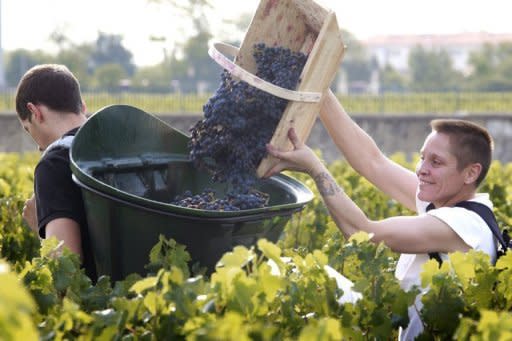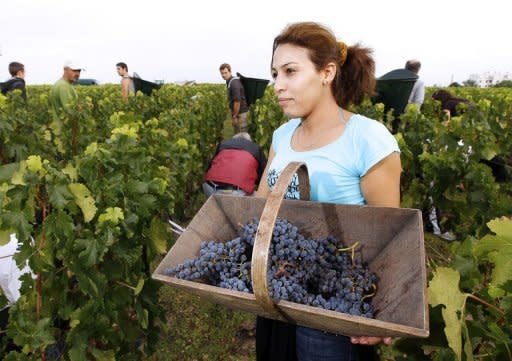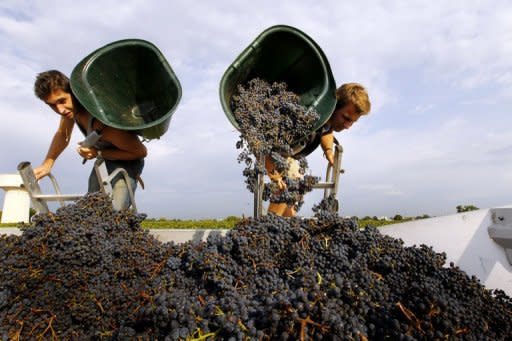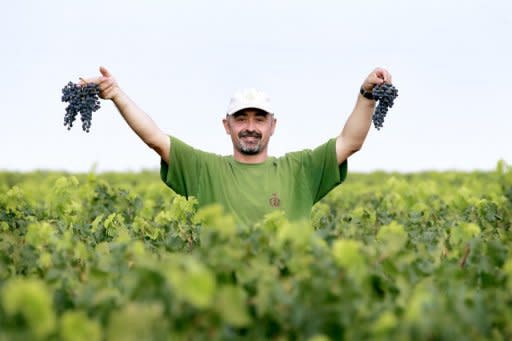Prices may drop at Bordeaux wine futures sale
Global wine buyers converge on Bordeaux for the annual futures sale that opens Monday, with a hit-and-miss vintage seen as a chance to pull skyrocketing prices back down to Earth. This year the main organiser of the event, the Union of the Grands Crus (UGC), expects to welcome about 5,000 wine professionals to the southwestern French city. Considering the chaotic weather that could have spelled disaster for grape quality, the mood was buoyant ahead of the barrel tastings kicking off the sale. "As a wine lover, I always feel very privileged that I get to have a look at all these babies," said London merchant Simon Staples of Berry Bros & Rudd. Consultant Denis Dubourdieu, head of the Bordeaux Institute of Vineyard and Wine Sciences, gave an upbeat assessment of the vintage: hit-and-miss reds, but some surprising whites. "The dry white wines are astonishingly good, there are numerous magnificent red wines on both banks from all grape varieties -- despite unquestionable unevenness," he said. Early impressions from major clients were similar. "There was some variation of course, but I was pleasantly surprised by the quality," said Chris Adams, CEO of Manhattan retailer Sherry Lehmann. "But if the prices don't come down, we can't buy it," he warned. That is Bordeaux's dilemma. Prices have skyrocketed over the last decade, alienating traditional customers in America and Europe in favour of rapacious demand from China's super-rich. Chateau Latour, for instance, released its 2010 vintage on the wholesale market for 780 euros per bottle, up from 600 euros for 2009 -- and 110 euros in 2008. Given Bordeaux's record year in export revenues worth 1.97 billion euros, wine traders say this good but unexceptional vintage is the moment to lower prices. "Logically, the prices should come down and that would allow Europeans and others to come back to the market after being bypassed by Asians, particularly the Chinese," said broker Max de Lestapis. "This is not a speculative vintage -- this is the moment to bring back customers who drink our wine," agreed Antoine Darquey, CEO of Les Vins de Crus. "The chateaux that profited from the 2009 and 2010 vintages must make an effort in the interests of traditional clients." China is now Bordeaux's number one trading partner, and a recently formed Chinese wine fund plans to spend 100 million euros over the next five years. But there is little talk of Chinese demand for this year's futures, which will play an important role in determining the price of the wine when sold in the coming weeks. This unique system, called "en primeur", allows buyers to stake a claim on coveted labels by paying 12 to 18 months in advance of their delivery. Last year, the Chinese made their first foray into Bordeaux futures, but lost money on their investment when prices plummeted during the last half of 2011. "En primeur as a concept for Asia is on a knife edge this year," said Staples. "One client said to me after last year's expensive and ridiculously long drawn out campaign that he felt like an overfed foie gras goose." "Our Chinese investors do not see this vintage as the one to begin buying on futures," confirmed Philippe Larche, CEO of Vintex and Les Vignobles Gregoire and advisor to the Dinghong Fund. "The world economic situation concerns them and they've heard it's not a great vintage." With the Chinese lukewarm on futures, Adams believes "this is a great opportunity to go back to how the system used to work with customers getting a good deal." Prices are determined by demand, the quality of the vintage -- and pride. "In Bordeaux, pricing is often a question of ego," observed one broker. "They price themselves according to what the other guy is doing." For this reason, many look to the First Growths -- the legendary names like Lafite, Margaux or Mouton -- to set an example to smaller producers by cutting prices and avoiding last year's mistake of a long, dull sales campaign. "It must be quick and a bargain. Nothing else will work," said Staples. But for now, the chateaux are keeping mum on their strategy. "It's difficult to talk about prices and too early to gauge interest -- first we have to show them the wines," said Paul Pontallier, general manager of Chateau Margaux. "Every year we try to please all of our customers. The problem is to adjust the price to demand."





